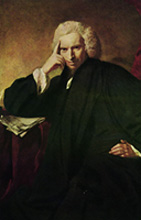| Laurence Sterne
was in a unique position as an abolitionist: he was an extremely popular
author. His book, The Life and Opinions of Tristram Shandy, Gentlemen,
went through over 14 editions! Undoubtedly, Sterne was able to use his popularity
to speak out against slavery. He wrote numerous letters and editorials,
and was able to utilize the growing genre of the novel to share his opinions
on the subject. Sterne had connections with other well-known persons, including
Ignatius Sancho. In fact, some of Sancho's widely-read
letters were written to Sterne: |
| "Of
all my favorite authors, not one has drawn a tear in favor of
my miserable black brethren- excepting yourself, and the humane
author of Sir George Ellison. I think you will forgive me; I
am sure you will applaud me for beseeching you to give one half-hour's
attention to slavery, as it is practised in our West Indies.
That subject, handled in your striking manner, would ease the
yoke (perhaps) of many- but if only of one!" (100) |
| Sancho's
letter tells us a few things about Sterne. For instance, he
is one of a few well-known writers who openly condemned slavery.
Also, Sancho, as well as many readers, held Sterne in high esteem
for his writing. Not only could Sterne speak out against slavery
in his own writing, but when Sancho's letters were published,
Sterne's position on the issue would be even more well-known..
Two popular and respected men openly condemning slavery must
have made a tremendous impact on the common person's opinions
on the subject. |
|
|
|
| Sancho mentions
that Sterne is one of the few authors to criticize slavery. His most popular
book, Tristram Shandy, makes several references to products produced
by slaves. But, he also makes an explicit statement on the institution: |
Tell
me then, my dear brother Shandy, upon which of them it is, that when I condemned
the peace of Utrecht,
and grieved the war was not carried on with vigour a little longer, you
should think your brother did it upon
unworthy views; or that in wishing for war, he should be bad enough to wish
more of his fellow-creatures
slain,--more slaves made, and more families driven from their peaceful habitations,
merely for his own
pleasure:--Tell me, brother Shandy, upon what one deed of mine do you ground
it? (101) |
| Sterne attacks the
treaty of Utrecht (see introduction), which gave
rise to the English slave trade, and asserts that slavery is for the slave
owner's own pleasure. The rise of the novel as a popular medium allowed
Sterne to disseminate his antislavery opinions widely, and given his enormous
popularity, it is conceivable that he influenced many English readers. |

